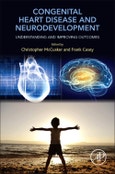Medical and surgical advances have meant that greater numbers of children with even the most severe congenital heart disease (CHD) now survive well into adulthood. Studies over the past 20 years have suggested certain neurodevelopmental and psychological features are common, with clinical interventions being internationally articulated. The U.K. Belfast Center has developed and evaluated unique early intervention programs to circumvent the common problems discerned and promote optimal adjustment and outcomes. The first edition of Congenital Heart Disease and Neurodevelopment: Understanding and Improving Outcomes describes these programs in detail and outlines promising results obtained by researchers worldwide. Such interventions, together with the U.S. consensus statement (Circulation, 2012) on neurodevelopmental screening, hold great promise for clinical interventions.
Please Note: This is an On Demand product, delivery may take up to 11 working days after payment has been received.
Table of Contents
Part I: Hearts and Minds 1. Congenital Heart Disease: The Evolution of Diagnosis, Treatments and Outcomes Frank Casey 2. Historical Perspectives in Pediatric Psychology and Congenital Heart Disease Nichola Rooney
Part II: Towards a Neurodevelopmental Phenotype 3. A Longitudinal Study from Infancy to Adolescence of the Neurodevelopmental Phenotype Associated with d-Transposition of the Great Arteries David C. Bellinger and Jane W. Newburger 4. Neurodevelopmental Patterns in Congenital Heart Disease across Childhood Longitudinal Studies from Europe Hedwig H. Hövels-Gürich and Christopher McCusker 5. An Emergent Phenotype: A Critical Review of Neurodevelopmental Outcomes for Complex Congenital Heart Disease Survivors During Infancy, Childhood, and Adolescence Maria Kharitonova and Bradley S. Marino
Part III: Psychological profiles and processes 6. Is There a Behavioural Phenotype for Children with Congenital Heart Disease? Christopher McCusker and Frank Casey 7. A Family Affair Nicola Doherty and Elisabeth Utens 8. The Adult with Congenital Heart Disease Danielle Emily Katz, Maria Chaparro and Adrienne Kovacs
Part IV: Interventions 9. The Congenital Heart Disease Intervention Programme (CHIP) and Interventions in Infancy Nicola Doherty and Christopher McCusker 10. Growing up Interventions in Childhood Christopher McCusker 11. Healthy Teenagers and Adults An Activity Intervention Margaret Louise Morrison and Frank Casey 12. Conclusions and Future Directions for Neurodevelopmental Research and Interventions in Congenital Heart Disease Christopher McCusker
Authors
Christopher McCusker School of Applied Psychology, University College Cork, Cork, Ireland.After attaining a first class honours and PhD in Psychology from The Queen's University of Belfast Christopher McCusker completed his Clinical Psychology training at the Institute of Psychiatry, Kings College London in 1991. Since that time he has combined clinical practice with leading the Doctoral programme for Clinical Psychology training in Northern Ireland and with research related to his clinical interests. He has been chair of the professional body for Clinical Psychology in Northern Ireland and had led on developments in training standards for the profession within the UK.
For the past 15 years his research has focused on understanding the determinants of outcomes for children with chronic illness and their families. This has been across pediatric specialisms including acquired brain injury, epilepsy, neurodevelopmental disorders and congenital heart disease. He has authored numerous publications in these domains and, most importantly, has translated knowledge of risk and protective factors into new progams of early psychological interventions to promote resilience in these children and their families. In this book he presents the Congenital Heart disease Intervention Progam (CHIP) which is the first of such programs internationally for these children and their families.
Frank Casey Consultant in Paediatric Cardiology, Royal Belfast Hospital for Sick Children, Belfast, Northern Ireland, UK.
Dr. Frank Casey is Consultant Paediatric Cardiologist at The Royal Belfast Hospital for Sick Children and an Honorary Senior Lecturer in Child Health at Queen's University, Belfast.
He trained In Paediatric Cardiology in Belfast and at The Hospital for Sick Children Toronto.
Dr. Casey is the Clinical Lead for the newly developed All-Ireland Paediatric Cardiology Network. He is also the Chairperson of The Psychosocial Working group of The Association for European Paediatric and Congenital Cardiology.
For more than 20 years he has led a research program in Belfast focused on the Biophysical, Neurodevelopmental and Psychosocial outcome for children with congenital heart disease. This work has pioneered interventional programs to modify lifestyle behaviors in children treated for congenital heart disease including the landmark Congenital Heart Disease Intervention Program described in this book. He has many publications from that research program and is recognized as an International leader in this area of work.








